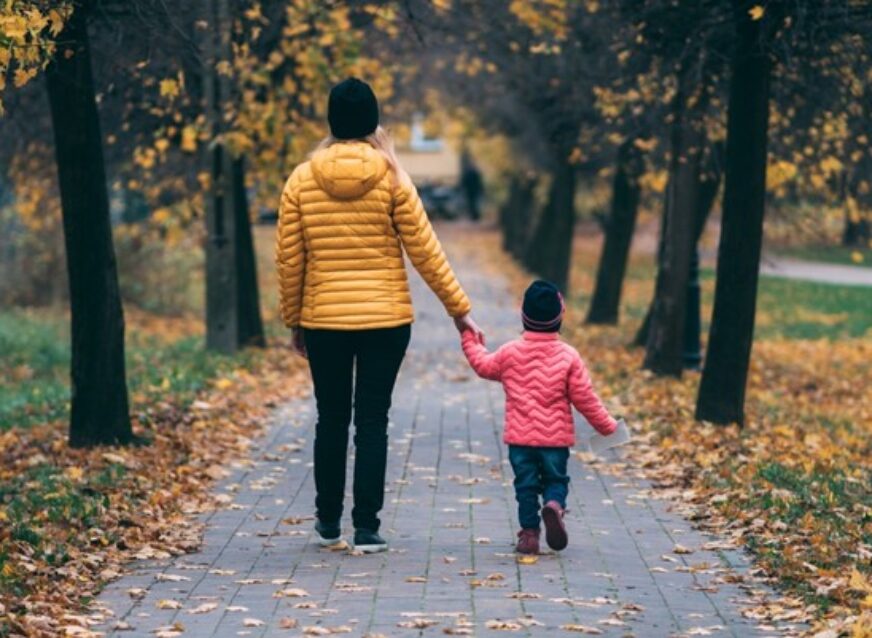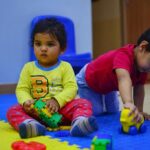
Role of parents in preparing the children in going back to pre-schools and day-cares
Love and support from the family during the early childhood years helps to build trust and confidence in a child. There are many emotions and challenges the child goes through but she knows that there is somebody who will take care of all her needs and her home is her safe harbour. One cannot deny the fact that children require constant attention and care in the initial 3-4 years. As we talk about the impact of staying indoors during the pandemic period, staying safe overrides the need for socio-emotional development of the child. However, a healthy social and emotional environment plays the most important role in success of children in all areas of life, be it academics or personal relationships. Due to changes in the urban family structure and daily schedule of working parents, it becomes increasingly difficult to provide the time and support in the early years. Parents are missing the stable support system and children are missing on crucial learning experiences. And every time I think about it, I am reminded of the very common saying –
“It takes a village to raise a child.”

Our neighbours and community are our first support groups. We are fortunate if we have the convenience of sending our children to the nearby park or society play area. As the best pre-schools in Kolkata and day-cares in Salt Lake are awaiting with open arms, parents can take some minor preparations which will help children settle down well in the new environment.
- Prepare yourself – Most of the changes are difficult for parents because we are not prepared. It is common to be anxious about our children, especially when they are going to step out of their home. Think about any change in our work life – it is always difficult to move out of our comfort zone and usual routine. Here it is our responsibility to remind ourselves that we are choosing the change for benefit of our child. When parents and family members are ready for the change, it often leads to an easy transition.
- Prepare them – Yes, children require preparation like adults. Talk about the pre-school/day-care that you have chosen for them. How it is going to be an opportunity to meet new people and make friends. Telling them stories is one way of preparing them emotionally. Talk positively about this new upcoming change in the child’s life. One can schedule a visit to the school and meet teachers and members at the centre before the actual start-date.

- Practice self-care at home – One of the very early practical demonstration a child gets from adults is washing hands. Let your child watch you a few times when you wash hands with soap and let him observe closely the movements of your palm and fingers. We can sing a song or a rhyme along. This helps in two ways, firstly child is drawn towards music and action, and secondly it acts as a timer for the entire process. Hence, we don’t have to tell each time how long he has to keep scrubbing. Children are capable of getting dressing on their own much earlier than most of us assume. The only key is to give them sufficient time and opportunity to practice. As adults, we often want to help the child with self-care practices due to lack of time. Well-meaning adults often do not realise that children want to be successful in doing things on their own. All we have to give them is patience. Another small yet important skill is learning to wipe nose and throwing the tissue in the bin. Children are happy and comfortable in taking care of their needs independently.

- Practice names for feelings – If you have attended any parental session on Socio-emotional learning, you are aware about the concept of naming emotions. It is a wise idea to use correct name for emotions in our daily conversations with children. Equally important is to recognize and accept every emotion. If children are able to identify how they feel, it is more likely that they will also learn how to manage the emotion. However, do not tell them how they will feel once the change happens. Give them the opportunity to tell you later instead of predicting it for them. Emotions like anger and jealousy must be treated normally and any punitive action should be avoided. It is also important to offer them choices to help them deal with the situation.
“I know you’re upset that you friend left. Do you want to play some more with me?”
“It looks like you’re happy to receive the gift. Would you like to thank Aunty?”
Knowing the vocabulary for different feelings and emotions will help children to communicate with you in a better way. They will be able to respond to you when you have a conversation with you at the end of the day. Remember to have family conversations during meal times. Share about your day and also ask them about their day. Sometimes they will just show you using expressions and gestures about how they feel. Be there to give big hugs as often as possible.
Children will be at different points in their learning journey. Parents, adults and teachers must allow children continue from where they are and not enforce any fixed learning outcomes. Talk to the teachers in the pre-school/day-care and discuss issues that bother you as a parent. Communicate when you are worried. Parents and teachers often can find a solution together.
Do not look for children to deliver what we expect; give them what they need from us.











